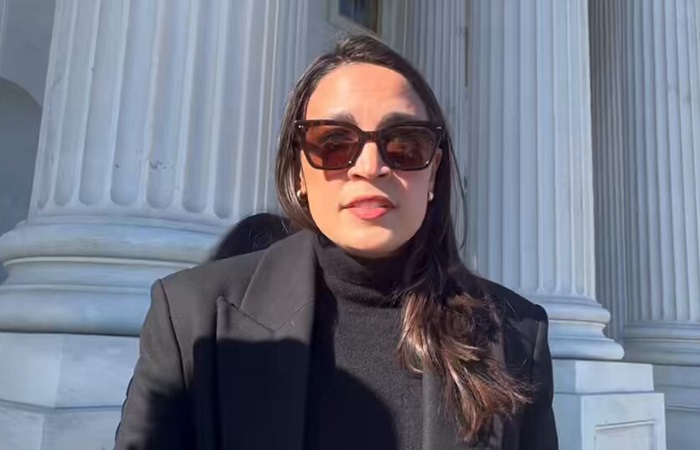(Crankers) Democrat Alexandria Ocasio-Cortez, a former bartender turned politician, responds to the murder of UnitedHealthcare CEO Brian Thompson. She was talking about the sentiment some people have expressed on social media, with them not being able to feel bad because he was leading a company who was known to deny a lot of claims, potentially seeing them suffer or worse.
It’s unclear what the statistics are on UnitedHealthcare’s claim denial rate, but that’s the context of some people’s sentiment online – and that’s what AOC is talking about here. She said, “This is not to say that an act of violence is justified, but… they need to understand that people interpret and feel and experience denied claims as an act of violence against them.”
Brian Thompson’s murder has sparked conversations about how bad some health insurance companies are, and how some of them are purposely placing profits over the well-being of their customers. Here’s AOC on video:
Who was Brian Thompson? He was the CEO of UnitedHealthcare, a major health insurance company in the United States. He served as CEO since April 2021 and was responsible for overseeing the company’s various health coverage programs, including Medicare, Medicaid, and employer-sponsored plans. Thompson had a long career at UnitedHealth Group, starting in 2004, and held several key financial roles before becoming CEO.
Tragically, Brian Thompson was shot and killed on December 4, 2024, outside the New York Hilton Midtown hotel while en route to an investor conference. The suspect, Luigi Mangione, was arrested a few days later and charged with second-degree murder. The shooting has sparked discussions about healthcare policies and the role of health insurance companies in the U.S.
Who is Alexandria Ocasio-Cortez? She is a former bartender who is often referred to as AOC, is an American politician and activist. Born on October 13, 1989, in the Bronx, New York, she represents New York’s 14th congressional district in the U.S. House of Representatives. She is a member of the Democratic Party and identifies as a democratic socialist.
Ocasio-Cortez gained national attention in 2018 when she defeated 10-term incumbent Joe Crowley in the Democratic primary for New York’s 14th congressional district. She went on to win the general election and took office in January 2019, becoming the youngest woman ever to serve in the U.S. Congress.
She is known for her progressive platform, which includes support for Medicare for All, tuition-free public college, a Green New Deal, and the abolition of U.S. Immigration and Customs Enforcement (ICE). Ocasio-Cortez is also a prominent advocate for social and economic justice, and she uses social media effectively to connect with young voters and promote her policies.



10 Comments
I’m curious, do we have any numbers on how many claims UnitedHealthcare actually denies? It’s easy to join the outrage bandwagon, but I’m genuinely interested in the stats. Seems like that’d add some needed perspective.
That’s a valid point. The overall claim denial rate in the industry would offer a solid benchmark for comparison. I wonder how UnitedHealthcare stacks up.
aoc has a point tho, getting your claim denied can feel really personal. healthcare should be about caring for people, not just profits
One must examine both the systemic issues within the health insurance industry and the individual case of Brian Thompson. It’s crucial not to conflate the two.
lol, so now we blaming CEOs for everything? watch out, your next denied claim might be personal
While it’s essential to empathize with those affected by denied claims, it is equally important not to justify violence as a means of response. There must be a balance in how we approach this discussion.
Well, if AOC was running UnitedHealthcare, would she just approve all claims? Wonder how long before the company tanks. Just saying.
It’s not about approving all claims. It’s about creating a healthcare system where people don’t have to fear getting sick. Something has to change.
Violence is never a solution, regardless of the circumstances. However, this tragedy should prompt us to look critically at how health insurance companies operate.
The ethical implications of this incident are manifold. One must ponder the intersection of corporate responsibility, societal health needs, and individual actions. A tragic event, indeed.